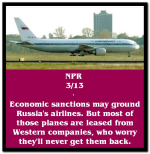- Joined
- Apr 18, 2013
- Messages
- 96,678
- Reaction score
- 85,942
- Location
- Barsoom
- Gender
- Male
- Political Leaning
- Independent
The IMF says a Russian debt default is no longer ‘improbable’ after banks freeze half of Moscow’s foreign reserves

IMF Managing Director Kristalina Georgieva.
Many outstanding sovereign debt loans owed by the Russian Federation must be paid back in hard currencies (Dollars/Euros/Yen/Pound/Franc).
No one wants the now worthless Russian ruble, and attempting to make loan payments with Russian rubles would constitute a sovereign debt default.

IMF Managing Director Kristalina Georgieva.
3.14.22
A Russian sovereign default is no longer an “improbable event”, International Monetary Fund (IMF) Managing Director Kristalina Georgieva said on Sunday, as economic sanctions prevent the country from tapping into its war chest of foreign reserves and paying down outstanding debt. “Russia has the money to service its debt, but cannot access it," Georgieva said on CBS’s “Face the Nation," as Russia risks defaulting on its debt this week. Russia had built up approximately $640 billion in foreign reserves since it last invaded Ukraine, annexing Crimea in 2014 and suffering a slew of economic sanctions in retaliation. The Russian central bank could have used those reserves to prop up the value of the ruble and salvage its economy this month, after sanctions levied against Russia over its February invasion of Ukraine caused the currency to tank. Yet Russian finance minister Anton Siluanov admitted Sunday on state television that U.S., European and Japanese sanctions means the central bank can no longer access about half of its foreign reserves.
Siluanov said that, so long as sanctions against the country remain in effect, Russia would use rubles to pay back its debt—even if the debt is owed in foreign currency. Russia is scheduled to pay $117 million on two dollar-denominated bonds on Wednesday. If the country doesn’t pay, it has a 30-day grace period to make a payment before it is technically in default. The bond does not allow Russia to pay its obligations in rubles, which means Russia's promise to pay back debts in rubles would still trigger a default. The international finance sector is bracing for such an event, which would mark Russia's first default on debt since 1998, and its first on foreign-held debt since 1917. Fitch downgraded its rating for Russian government bonds to its second-lowest level last week, saying that a Russian debt default was “imminent”. Moody’s and S&P have also downgraded their ratings of Russian bonds to junk status.
Many outstanding sovereign debt loans owed by the Russian Federation must be paid back in hard currencies (Dollars/Euros/Yen/Pound/Franc).
No one wants the now worthless Russian ruble, and attempting to make loan payments with Russian rubles would constitute a sovereign debt default.



